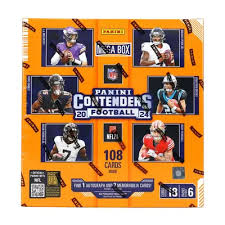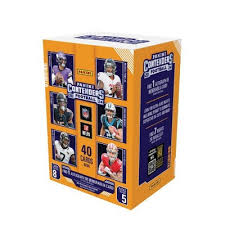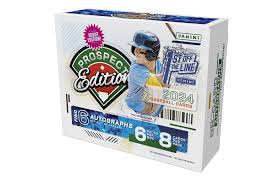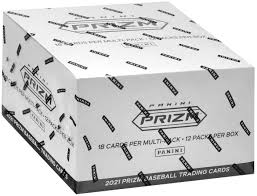

Panini received some welcome news after years of desolation when a federal judge ruled Monday that the dueling lawsuits between Fanatics and Panini America can proceed to discovery.
The entire proceeding is based on Panini’s claim that Fanatics is illegally and unfairly violating the antitrust law to cement a position of undue dominance in the market. Therefore, Panini will be satisfied that they (mostly) cleared an important hurdle in this case.
Chief U.S. District Judge Laura Taylor Swain’s ruling in the Southern District of New York wasn’t a pure 100% win for Panini. Indeed, you could say that it offered mixed results for the parties.
She partially granted and denied various motions and in theory at least, she determined that both companies’ complaints held merit. The elements she denied were not final. They could refile within 21 days if desired, with enough additional evidence to warrant reconsideration.
The stage the case was in, involved determining whether Panini’s complaints had enough merit, in the way they had presented them, to move on to determine them on the substance. Judge Swain got to the heart of the matter, when she noted that, “To produce a desirable trading card for a particular sport, sellers must combine licenses from the league itself and the relevant players association.”
Therefore, the companies’ agreements with the leagues and the players associations determine the value of the relevant cards. That means the court is willing to weigh the claims by acquiring the rights to all those leagues and player associations, reduces the value of cards made by other companies.
The judge also believed there was enough merit in the Fanatics claim that the Fanatics policy of achieving long-term exclusives with the relevant entities, limited competition. She noted Panini claims that Fanatics had made an unfair play for the printing company that makes the Panini cards.
Panini claims that the Fanatics’s takeover of GC Packaging was “in violation of the change of control provision in the Panini-GCP contract.” The judge also noted the claim of the material damage this did to Panini, which caused “an output shortfall of over 100 million packs of Panini trading cards…resulting in canceled orders and lost or reduced sales.”
The ruling highlights Panini claims that Fanatics had taken to establish more control over local card stores and muscle out Panini and their products in the process: “Fanatics engaged in a real time campaign to bully market participants by threatening to exclude them from the relevant markets when Fanatics exclusive licenses began if they did not comply with their immediate demands.
Specifically, Panini claims that Fanatics demanded that big box retailers provide Fanatics with better margins than before and required that retailers “carry a more limited line of trading card options – the ones belonging only to Fanatics (through Topps). Forced local trading shops to set minimum price requirements and threatened to drop them (in the future) if these price terms were not heeded. Forbade local card shops from selling on business-to-business websites. Forced case breakers to migrate their streaming platforms to “Fanatics Live” on terms so draconian as to run their case breaking businesses into the ground and pressured star rookies and players to sign exclusive deals with Fanatics before Fanatics owned the licenses necessary to utilize those rights, all to harm Panini’s business.”
It is worth noting that On a motion to dismiss, there is a very liberal standard for moving the case to the next phase. Therefore, Swain predictably rejected Fanatics’ argument that Panini lacked legal standing for its antitrust claims. The judge found that Panini had “adequately pleaded facts” supporting its assertion of Fanatics’ “monopoly power” in the industry.
Indeed, there is some merit to the claim that Panini had not acted in the same monopolistic way that Fanatics is now in the past. She said that when it was in the card business, Panini had held exclusive contracts “largely for terms of fewer than five years, and it has never held more than four relevant licenses on an exclusive basis simultaneously.”
That is the most crucial victory that Panini achieved here. They filed under counts I-III and V of the Sherman and Clayton Acts. Fanatics moved to dismiss all of them. But to their disappointment, Judge Swain has granted their wish only on count V.
That means that the court will move forward on count I-III. Though these motions are usually granted, that is not something you can take for granted. After all, Fanatics still owns only 33% of the market. However, the court determined that, “Panini adequately pleaded that Fanatics “currently possesses monopoly power as demonstrated through its ability to set prices and exclude competitors” even though it currently only has 33% of the licenses at issue.
According to claims from Panini, Fanatics “secured licenses in five out of six of the Relevant Licensors for terms beginning in 2025 and 2026” and that “starting in 2026, Fanatics will control 100% of the Relevant Market for a term of at least ten years.” She also noted Panini’s claim that “There was a conspiracy between the NFLPA, the MLBPA and Fanatics to license both the players associations’ intellectual property on an exclusive basis.”
Fanatics’ interpretation of the court of the takeover of GC Packaging is positive from Panini’s perspective. Judge Swain believed there is enough merit to proceed and adjudicate claims that Fanatics took this malicious and very damaging step. Panini also claimed “where a business uses its dominant market power to ‘coerce’ market participants into such agreements, it crosses the line into uncompetitive conduct.” That is a claim the court will now examine. In addition, they will examine the claim that “evidence of threats of termination or other explicitly coercive conduct that secure adherence to fixed prices is what supports ‘a finding of [a transgression of the Sherman Act].’”
Swain dismissed Panini’s claim of irreparable damage, noting that “as one of the two remaining competitors in the field, Panini benefited from the alleged market concentration as a prevailing duopolist with ‘the opportunity and incentive’ to increase prices.”
That means that the courts dismissed the claims that Panini had that by buying Topps Fanatics had infringed on anti-trust laws. That is good news for Fanatics. However, that claim was always a stretch. I was surprised to see it in the original claim and not surprised that it was thrown out.
The judge also noted that Panini “has not provided sufficient allegations that the [six] exclusive deals were part of a single, connected conspiracy.” Panini was also unable to prove most of its defamation claims.
Aside from one, that Fanatics allegedly told stakeholders that “Panini would be unable to fulfill its contractual obligations to athletes, that Panini was going to go bankrupt, and that Panini would lose its licenses…by June 2023.”
However, this is not all that important. The heart of the case is elsewhere. Therefore, this is not much of a win for the folks at Fanatics.
We received a statement from Fanatics. They told Cardlines that, ““We are pleased that the Court has already rejected a number of Panini’s claims and is allowing Fanatics’ case against Panini to move forward. Unlike Panini’s baseless allegations, we look forward to presenting actual evidence about how, in just a few short years, we have materially grown the hobby through investments, innovation, better products and marketing and a relentless focus around enhancing the overall collector experience. The facts will show that Panini has lost touch with its consumers and continues to be unwilling and unable to keep pace with what collectors and the hobby want. Panini is just using this lawsuit as a tool to deflect from its own failings in a desperate attempt to slow down Fanatics.”
As we have seen, Panini has more reason to celebrate than their rivals. After all, the case they failed, which many observers felt may have been overambitious, was accepted on its merits.
Both parties found reasons for optimism in the ruling. Stuart Singer of Boies Schiller Flexner, representing Panini, stated, “We are gratified by the federal district court’s decision which upheld Panini’s principal antitrust claims and state law claims against Fanatics. Preserving meaningful competition in the global sports trading card business is critically important for fans, players and collectors.”
Industry expert Ed Schauder offered a pragmatic perspective on the case’s likely outcome. “Panini won a round,” he noted, speaking from Palm Beach Gardens, Florida. “I can see (Fanatics) paying money damages but (the courts) are not going to unwind this.” Perhaps most intriguingly, he added, “I still think Fanatics will merge with Panini. I do.”
An unprecedented legal battle was unleashed in August 2023 when Panini filed a lawsuit alleging their rivals engaged in aggressive monopolistic practices.
Fanatics’ exclusive long-term deals with the NBA, NFL, and MLB are at the heart of the dispute, effectively locking up the significant sports card markets for 15-20 years. Panini claims they weren’t even allowed to bid on these licenses, learning about the agreements only after they were announced in the media.
The lawsuit outlined several tactics used by Fanatics that were concerning. These included their acquisition of GC Packaging, Panini’s primary card printer, which has allegedly been used to restrict Panini’s production capabilities.
Fanatics also provided equity stakes to leagues and players’ unions—something neither Topps nor Panini had done—creating what Panini describes as an “incestuous relationship” that further cements Fanatics’ control over the industry.
Panini’s allegations extend far beyond attempts to cement market control. They claim Fanatics engaged in systematic defamation to current and potential future business partners.
They alleged, inaccurately as we have since seen, that Panini would soon be out of business and lacked funds to pay its obligations. Additionally, Fanatics CEO Michael Rubin allegedly threatened to withhold jersey patches – crucial for high-value cards – from Panini cards.
In addition, another lawsuit, Fanatics was accused of aggressively poaching key Panini employees while threatening their future employment prospects in the industry.
When Fanatics won the rights to the NBA and the NFL, it had appeared that the axe had fallen on Panini. Their entire business model was based on those releases.
It was difficult to see how they could remain in business after losing those rights. Most observers assumed they would now be content to bide their time until the takeover.
However, that is not how things panned out. Fanatics were unwilling to wait until their time came patiently. Instead, they aggressively squeezed Panini out of the marketplace even before their existing licenses expire.
These alleged aggressive tactics seem needlessly hostile, from restricting production to poaching employees. And yes, they seem to go beyond legality into some very shady pressure tactics. Rather than their market position alone, this behavior has proven the most problematic in the antitrust case.
There is nothing illegal about pursuing market domination per se, though theoretically, the government can regulate and break up trusts. However, they are reluctant to do so. Instead, a strong market position must be pursued fairly and patiently.
This is good news for Panini, but it does not mean they are going to win the case. The ruling simply means they will get a shot at making their arguments and that the court thinks their case has enough merit to be carefully considered.
The most likely outcome could be monetary damages rather than a structural reorganization of Fanatics’ licensing deals. The suggestion that this might all end in a merger between the two companies is particularly intriguing, as it would represent a dramatic twist in what has become an increasingly bitter corporate rivalry.
This case means more than a corporate legal battle for collectors and industry stakeholders. It’s about the future of sports card collecting – whether the hobby will be dominated by a single entity or maintain some degree of competition and diversity.
2025 Topps All Star Game Mega Box Product Review
Ripping the new Topps All Star Game mega box.
Is this new sports card store the BEST VALUE around?
I Tested eBay Auction Promotions So You Don’t Have To!
I deep-dove on Fanatics Collect so you don't have to (but should you?)
Panini is launching a WNBA Product at $30,000!?
Topps Chrome 2024-25 Basketball: Honest Review and Notes
Did you know this SECRET about PSA slabs? #sportscard #tcg







2022 Topps Heritage Baseball Blaster Box Configuration: 7 Packs per Box – 9 Cards per Box. Plus 1 extra pack.









Keep up on breaking Sports Card News, our latest articles, product specials and exclusive content with expert analysis of hobby trends.

© Copyright 2025 - All rights reserved Cardlines.com / Media Techs LLC - Sports Card News, Reviews, Releases and BREAKS - #thehobby.
Important: When you click on links to various merchants on this site and make a purchase, this can result in this site earning a commission. Affiliate programs and affiliations include, but are not limited to, the eBay Partner Network.
The Ultimate 2024 Football Card Brand Tier List (Panini vs. Topps and more!)
Cardlines July 7, 2025 7:00 pm